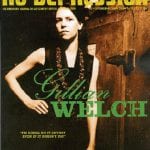Adam Carroll – Character references
Adam Carroll might be peddling short stories to the New Yorker today had he not fallen into a rock ‘n’ roll fantasy, namely the notion that he could get girls with a guitar. He’s not saying if it worked, but literature’s loss is music’s gain. Carroll’s keen observations of the commonplace yield characters as familiar as the next cab driver, or the guy slinging suds in the coffee shop kitchen. With marvelous economy, the former student of poetry and creative writing imparts a vital sense of character and motivation, like, say, Faulkner or Steinbeck, or, for that matter, Guy Clark.
“One of the perks of playing and singing and driving is you just get to meet real people,” Carroll says. “There are vibes I feel from people, maybe some of it’s just imagined, or maybe it’s just what I feel and I put that into the characters.”
Carroll’s characters are often composites, but some are mostly real, like the unapologetically stereotypical aging rural Texan in “Race Car Joe”, and especially the old-timer and fishing buddy of “Erroll’s Song”. Carroll’s intimacy with the rest is more remarkable for being once-removed. “At first, I didn’t know what my own voice sounded like,” he says, “so I just imagined somebody else singing the words.” Most often it was Johnny Cash or Waylon Jennings, but “I imagined Terry Allen writing ‘Legs’,” he says of the part sexy, part funny tale of a model in a rock ‘n’ roll photo shoot. “The longer I write, the more I’m writing on my own.”
Carroll’s singing voice has a natural character somewhere between Joe Ely’s and Blaze Foley’s. It’s drenched in the warm, good humor that pervades his personality, and he sings like someone who would be fun to know. Then there’s his guitar playing, which quickly outgrew its potential as a girl magnet and took an extended detour through classical training.
“There’s just a great teacher in Tyler, Frank Kimlicko, who came up in New York being a jazz musician and then studied with a big classical guitar family from Spain,” Carroll explains. “I knew a couple chords, but he retaught me how to play.” Carroll’s classical training may account for his ability to give texture even to songs as breakneck fast, and Dylanesquely wordy, as “Red Bandana Blues”.
Carroll built an audience the hard way, hosting song-swaps throughout Texas and eventually moving from Tyler, in Northeast Texas, to San Marcos, near Austin, in 1999. He released his debut album, South Of Town, that year, and followed it up in 2000 with Lookin’ Out The Screen Door.
“Since I’m independent, nobody knows who I am,” he says, laughing. “So I just go on little bitty tours — Arkansas, Tennessee, New Mexico.” It’s tough work, but someone has to do it. And everyone he meets is a song.




